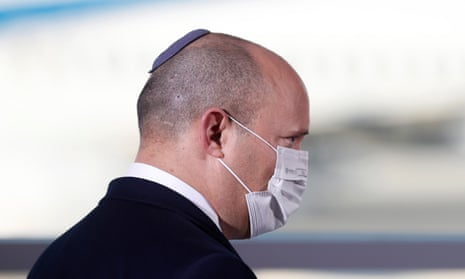Israel has decided to reimpose the mandatory wearing of masks in enclosed public spaces owing to a rise in Covid-19 cases just 10 days after the measure was lifted – a blow for a country that has prided itself on one of the world’s most successful vaccine rollouts.
The head of Israel’s pandemic response taskforce, Nachman Ash, told public radio on Friday that mask mandates in most indoor situations would be reinstated from noon, after the country recorded four successive days of more than 100 new cases. Thursday’s count of 227 new cases was the highest daily caseload in more than two months.
“We are seeing a doubling every few days,” Ash said on Friday. “Another thing that’s worrying is the infections are spreading. If we had two cities where most of the infections were, we have more cities where the numbers are rising and communities where the cases are going up.”
Ash said the rise in cases was probably due to travellers returning to the country infected with the highly contagious Delta variant, which is believed to be responsible for 70% of the new cases.
Reimposing the mask requirement is a setback for Israel, coming so soon after the measure was lifted on 15 June following one of the world’s quickest vaccination campaigns.
Approximately 5.2 million of the 9 million-strong population have received both doses of the Pfizer/BioNTech vaccine, after Israel procured millions of doses in a special deal with the drugmakers in which it received early supplies in exchange for sharing health data on the vaccines’ impact.
Israel has received criticism, however, for refusing to vaccinate most Palestinians living in the West Bank or in the Gaza Strip, which is under Israeli blockade. Only about 270,000 Palestinians have received two doses, according to the Palestinian health ministry.
A deal between Israel and the Palestinian Authority, which controls the West Bank, for 1m Pfizer/BioNTech jabs was called off last week after the PA rejected the shipment, saying the doses were on the verge of expiring.
The authority has received 5,000 vaccine doses from Israel so far, as well as shipments from Russia, China, the UAE and the UN’s Covax programme for low- and middle-income countries.
Ash said that despite the increased number of positive cases in Israel, there had not yet been a parallel rise in hospitalisations or deaths, and that he hoped a fourth wave of serious infections could be avoided.
“It’s clear it’s a factor of time, that not enough time has passed,” Ash said. “But we hope the vaccines will protect us from a rise in hospitalisation and difficult cases.”
The health ministry’s new directive urges Israelis to wear masks in crowded outdoor spaces too, including at Pride events scheduled for this weekend.
A Pride march on Friday afternoon in Tel Aviv was expected to draw tens of thousands of people in the largest public gathering since the pandemic began. Last year’s event was suspended owing to the virus.
This week Israel delayed plans to allow the renewed entry of individual tourists, and said other steps may have to be taken to counter the spread of the Delta variant. Israeli media has speculated there may be a return to limiting numbers on gatherings.
The northern town of Binyamina, near Haifa, earlier this week was categorised as red under the country’s traffic light system – the first such designation in several months.
The rise in coronavirus cases is one of the first challenges facing Israel’s new coalition government, headed by Naftali Bennett as prime minister, who warned on Tuesday that the country could be facing a new outbreak and asked citizens to limit international travel.
Yuli Edelstein, the health minister under the former prime minister Benjamin Netanyahu, wrote on Twitter: “When the government receives a healthcare system in excellent shape and blames its predecessor for its own failures, its citizens ought to be worried. This was the state of the infection on the day of the changing of the guard in the health ministry: 253 active cases, 0.02% testing positive, an average of 12 sick people every day. And the finale – 5.5 million vaccinated people.”
The fall in new cases allowed much of daily life to return to normal but did not save Netanyahu’s job: Bennett, a onetime aide turned political enemy, replaced him as prime minister this month.
